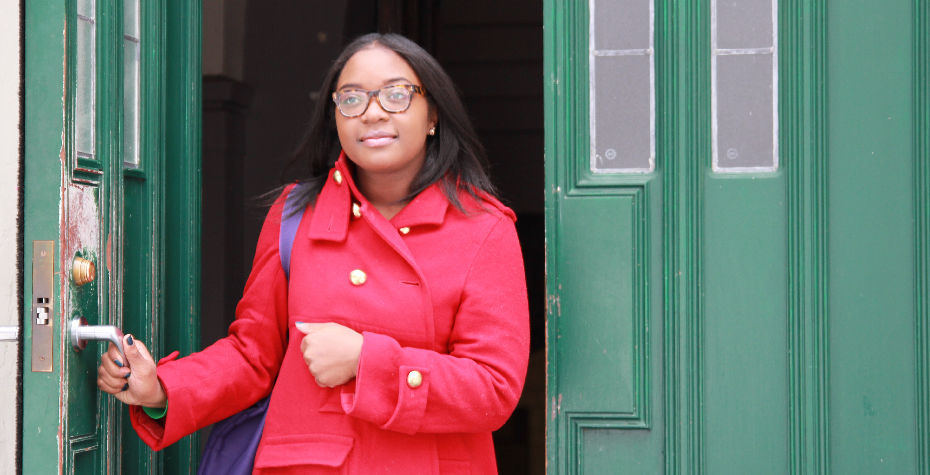Faith Fells ’15 Wins Woodrow Wilson-Rockefeller Brothers Fund Fellowship for Aspiring Teachers of Color

Wellesley congratulates Faith Fells ’15, one of eight college seniors nationwide to win a 2014 Woodrow Wilson-Rockefeller Brothers Fund Fellowship for Aspiring Teachers of Color. The fellowship provides mentoring and a $30,000 stipend to help each recipient complete a master’s degree in education and become an outstanding teacher in a high-need public school.
For Fells, a political science major with a minor in education, the award validates a career choice she has been moving toward most of her life.
“My grandmother and great-grandmother were teachers, and my father, who worked in public service, was always active in my schools,” she explains. “When I was in kindergarten, he would help organize field trips to food banks, where we would pack bags for young people or students in need. Giving back to the community was a way of life for him.”
For Fells’ mentors at Wellesley, the honor confirms what they have known all along: Her perspective and experiences are needed in public-school classrooms, where the majority of students are of color, yet the majority of teachers are white.
Fells, a Detroit native, attended public schools through eighth grade. Her parents sent her to a private high school, something many families in the area could not afford.
The difference between public and private school was dramatic, she recalls. “Public schools often lacked resources, and one or two guidance counselors worked with hundreds of students,” she says. “Yet there were only 40 students in my senior class at Academy of the Sacred Heart.”
Fells’ favorite teachers, in both settings, were those who took an interest in her life inside and outside the classroom.
“Aspiring urban teachers must understand that becoming an effective teacher means connecting the subject content they are trained and expected to teach with the lives of the students in their classrooms,” says Kenzo Sung, Mellon Postdoctoral Fellow in Education at Wellesley and one of Fells’ mentors. “The most meaningful and sustainable changes are those that connect teachers with their students, parents, other teachers, and others in the neighborhood to create a community of learning and change.”
At Wellesley, Fells says she has learned a holistic approach to education and the value of active discussion as a way for students to try out ideas and learn from one another. Fells has applied those lessons, and others, to a variety of educational activities during her Wellesley experience. She has worked as an assistant teacher in the Aga Khan Education Services in Kampala, Uganda, where she developed curriculum and taught independently in classrooms with an average of 40 students. She has mentored Boston high school students through the college application process through the Bridging the Gap program and has tutored children aged 5 to 7 in the Mission Hill After School Program in Boston.
Fells’ passion for teaching increased when she worked as a junior associate in the Washington, D.C., public school system last summer, helping to launch summer school courses, analyzing enrollment data, and mentoring high school students. “There was such a disconnect between [employees in] the central office and the standards they [expected] from students, because many hadn’t actually worked in classrooms,” she says. “I knew I needed a teaching background to understand and address that disconnect.”
As Fells completed her internship, she realized something else: She could have more of an impact in the classroom by working as a teacher.
Fells learned about the Woodrow Wilson-Rockefeller Brothers Fund Fellowship for Aspiring Teachers from Elizabeth Mandeville ’04, director of fellowship programs, and began the rigorous application process in October, with help from Mandeville, Sung, and education professor Barbara Beatty.
“Education can be used as an equalizer, to eradicate many of the institutional problems in society,” says Fells. “Teachers of color enable underserved students to see that it is possible to expand their world and use education as a tool to better themselves.”
Beatty concurs. “Education is one of our most important civil rights, and Faith is joining a long tradition of Wellesley-trained teachers who have made a difference in underserved and many other schools,” she says. “With Faith’s education, experience, enthusiasm, and warmth, she has impressive talents to bring to urban teaching. She also has high expectations for academic achievement, for all students, along with the knowledge to plan and teach sophisticated curricula in creative ways, and create the safe, supportive learning environments all students deserve.”
